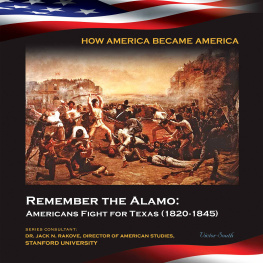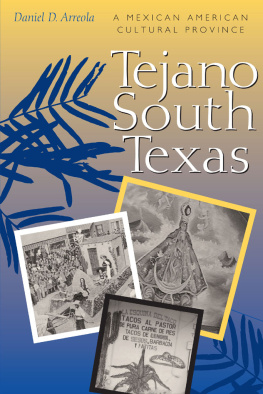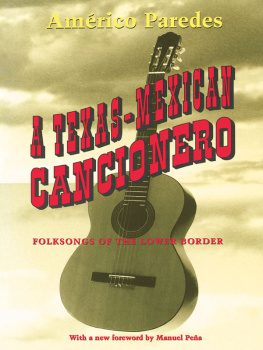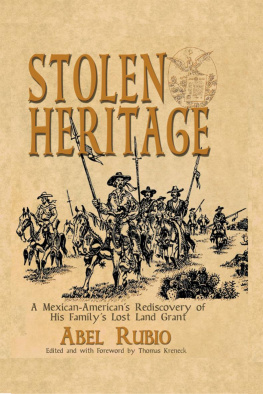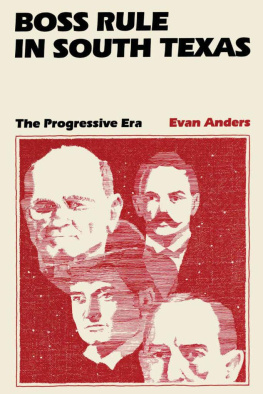Number Forty-Five
Jack and Doris Smothers Series in Texas History, Life, and Culture
Batos, Bolillos, Pochos, and Pelados
Class and Culture on the South Texas Border Revised edition
CHAD RICHARDSON AND MICHAEL J. PISANI

University of Texas Press
Austin
Copyright 1999, 2017 by the University of Texas Press
All rights reserved
Revised edition, 2017
First edition, 1999
Publication of this work was made possible in part by support from the J. E. Smothers, Sr., Memorial Foundation and the National Endowment for the Humanities.
Requests for permission to reproduce material from this work should be sent to:
Permissions
University of Texas Press
P.O. Box 7819
Austin, TX 78713-7819
http://utpress.utexas.edu/rp-form
Library of Congress Cataloging Data
Names: Richardson, Chad, 1943 author. | Pisani, Michael J., 1962 author.
Title: Batos, bolillos, pochos, and pelados : class and culture on the South Texas border / Chad Richardson and Michael J. Pisani.
Other titles: Jack and Doris Smothers series in Texas history, life, and culture ; no. 45.
Description: Revised edition. | Austin : University of Texas Press, 2017. | Series: Jack and Doris Smothers series in Texas history, life, and culture ; number forty-five | Includes bibliographical references and index.
Identifiers: LCCN 2016050491| ISBN 978-1-4773-1272-8 (cloth : alk. paper) | ISBN 978-1-4773-1269-8 (pbk. : alk. paper) | ISBN 978-1-4773-1270-4 (library e-book) | ISBN 978-1-4773-1271-1 (nonlibrary e-book)
Subjects: LCSH: Social classesTexas. | Social classesMexican-American Border Region. | SubcultureTexas. | SubcultureMexican-American Border Region. | TexasRace relations. | Mexican-American Border RegionRace relations. | TexasEthnic relations. | Mexican-American Border RegionEthnic relations. | MexicansTexasSocial conditions. | MexicansMexican-American Border RegionSocial conditions.
Classification: LCC HN79.T43 R53 2017 | DDC 305.50972/1dc23
LC record available at https://lccn.loc.gov/2016050491
doi:10.7560/312728
To the individuals along this great fault line we call the border who shared their lives. They illuminated ours in the process.
CR and MJP
For Elizabeth and our children, with love and gratitude for their unfailing support.
CR
For Jana, William, Carina, and Geoffrey, with love.
MJP
Contents
WITH JUANITA VALDEZ COX
WITH DAVID ARIZMENDI
WITH DANIEL P. KING
WITH CHRYSTELL FLOTA
WITH JENNY CHAMBERLAIN
WITH JOHN SARGENT
Preface
One evening as I picked up the phone to call some relatives to ask them for an interview, my mom asked me why I needed to call them. I explained my sociology project and that I had chosen the subject of migrant farmworkers. She then asked me, Why dont you interview me? After all, nosotros fuimos migrantes [we were migrants]. Then she added, It is our turn to tell our story.
STUDENT INTERVIEWER
When we published Batos, Bolillos, Pochos, and Pelados in 1999, people like this students mom were able, many for the first time, to tell their own stories. Such individuals and their stories of life in South Texas are amazing. Though they, like population groups everywhere, are a mix of saints and scoundrels, we have found far more of them at the saints end of the continuum. While we admit to some bias in this conclusion, it is a bias borne of extensive research and some very poignant personal experiences over a period of almost forty years. We have found them to be amazingly resilient, many in the face of grinding poverty, race- and ethnicity-based discrimination, and outright exploitation.
Our challenge has always been to let the people of South Texas tell their own story. The setting for their accounts is the southernmost tip of Texas, bordering Mexico and the Gulf of Mexico. This is a land of seeming contradictions with a rich history, a unique racial/ethnic mix, and a people full of life and hope. Their amazing stories need to be heard.
Since we published the first edition of Batos, in 1999, many students, having read the accounts therein, have chosen to conduct their interviews on the same topics covered in that volume. As a result, over the ensuing years, the file of ethnographic accounts has grown, more than doubling the accounts we had to work with for the first edition.
The present book, however, is more than an updating of the first edition. Much has changed since 1999; some of it is encouraging, though change has also brought added challenges. When we published Batos, we neither envisioned the magnitude of the changes nor the quantity and quality of the student research that would follow. Together, these developments do justify a new volume. We continue our focus on class and culture in South Texas with special attention given to migrant farmworkers, life in colonias, maids, social inequality, education, the process of acculturation, ethnic minorities (Anglos, African Americans, and Asian Americans), and race in the South Texas borderlands. Yet, this book must be much more than a simple update or a minor revision.
When we published the first edition, we wanted a title that could represent the Valleys uniqueness and diversity. Batos, Bolillos, Pochos, and Pelados seemed to fit. Bato, to young Mexican Americans, means man, such as Oye, bato (Hey, man). It expresses in-group solidarity and epitomizes the sense of identity found among many young South Texas Mexican Americans. Bolillo (white bread roll) and pocho (faded, off-color), in contrast, are terms used to designate members of out-groups. The first indicates an Anglo (a non-Hispanic white), and the second a Mexican American who is regarded as overly Americanized in speech and culture. In Mexico, a pelado is someone suspected of criminal activity, the term possibly related to the practice of cutting very short the hair of Mexican prisoners. Along the border, however, it means someone disreputable, whether involved in criminal activity or not. For this edition, the term best fits those individuals or groups who engage in exploitation and abuse of the unique groups described in this volume. Though these terms are not normally used around members of these groups except in gentle kidding, they are part of local culture. Since this book emphasizes local culture and intergroup relations in South Texas, we felt the use of these colloquial terms, each closely related to the border, was appropriate.
In the chapters that follow, we specify more clearly what changes and challenges have emerged since 1999. Still, there are three changes that seem to affect all or most of the population groups we examine. One is the way immigration from Mexico and Central America has changed. Since 1999, the McAllen sector in South Texas has become the primary route of entry for undocumented immigrants across the US-Mexico border. It has also received the largest number of unaccompanied minors trying to escape drug-related violence in Central America.
The cartel wars and drug violence in Mexico and Central America constitute another impact on the South Texas border region. Though they have had a profound effect on life on both sides of the border, a spillover of violence into South Texas border cities has not really materialized as predicted by many politicians and journalists.
A third important development is the host of demographic changes in South Texas and northern Mexico. The border population is growing at a rapid rate, with Mexican-origin people becoming an even larger proportion of the population. Anglos are now only 7 percent of the population of the Lower Rio Grande Valley (the four southernmost counties of South Texas). The growth of colonias (impoverished rural border neighborhoods) has virtually ceased, and the size of the migrant farmworker population has been in fairly rapid decline, with undocumented workers moving to other occupations and other states.
Next page

